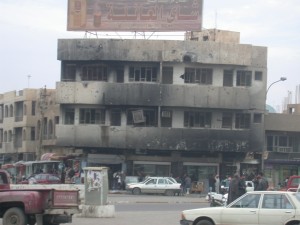From December 1 – 7, 2003 I traveled with a peace delegation to Iraq. We met with Iraqis in and around Baghdad to bring a message of peace and to listen to their stories and feelings about the occupation. The delegation members included parents of children serving in Iraq, veterans of the Vietnam War and myself a veteran of the first Persian Gulf War. The trip was both exhilarating and sad as we listened to Iraqis to tell us about the terror of Saddam’s rule and the current nightmare of the occupation.
There were many stories related to my professional work as a human relations facilitator fighting all forms of prejudice and bias. On several occasions Iraqis exhibited utter surprise that I am a U.S. citizen and not from Algeria or possibly France as the stereotypical image of “Americans” usually does not include people of African descent. Occurrences in both the Amsterdam and Amman airports revealed that the basketball stereotype of Blacks is alive and well even in far off lands. But these incidents are trivial when compared to the issues faced by many Iraqis. Security is a concern to all Iraqis but particularly to women. They find themselves in constant fear of sex crimes and abduction. A Palestinian leader told us of his second-class existence under Saddam: barred from owning property and citizenship, and limited access to education and employment. He explained that nothing has changed since the occupation. An Iraqi American who has returned to his country to help rebuild, describes his arrest by U.S. troops. They asked, “Why are you here,” and told him they do not trust any Iraqis especially intelligent ones who choose to stay.
But I was most struck by the stark reminder of the privilege I enjoy as a U.S. citizen. When I say privilege I do not refer to clean running water, reliable electrical power and accessible sources of food. Nor am I talking about TVs, DVDs, malls and cars. No. I am referring to the fact that no matter how much a country may disagree with our conduct, be it the treatment of our citizens, compliance with United Nations’ mandates or weapons we choose to develop, the likelihood of bombs falling from the sky and armies invading my homeland is near zero. It is more likely to happen to anyone but us and less likely to happen to our allies. America enjoys this enormous privilege. A privilege most of us seldom think about. A privilege that demands we accept tremendous responsibility. A privilege many times overlooked.
At times those of us in the activist community in our zeal to further the cause of economic and social justice focus our attention on the dynamics of oppressive behavior we see most often here in the U.S. We easily talk about White privilege, male privilege, Christian privilege, class privilege and heterosexual privilege. Obviously theses and other forms of prejudice and privilege are important, but it is equally and in some ways more important to remember our privilege as “Americans.” This subject is seldom broached or when brought up it is discussed as if only those who gain the most in America benefit from their presence here and we as activist do not eat of the fruit. We are some how exempt from any privilege because of our political and social activism. This sounds familiar. Like other privileges mentioned most of us in the privileged category do not take responsibility for our status. Just as all people with white skin in the U.S. no matter their social, political and activist views, have White privilege simply by being White, we in the U.S. enjoy privileges by simply living here. In a world context I am clear I benefit from my presences in the U.S.
From my perspective it is critical I acknowledge this privilege. By doing so I take ownership of the status I enjoy just by living here in the U.S. I believe this ownership gives me basis for a better understanding of my role as a citizen to change our nation for the better. Only through acknowledgment of my status and taking responsibility for it can I leverage my privilege to create change.
I have come to understand that I have many privileges. I am a Christian, heterosexual, able-bodied, American male. These privileges that come with these labels do not bring me guilt or shame. Instead the acknowledgement has brought me responsibilities and the power to create change. Guilt belongs to those of us who have privileges and do nothing to help make America and the world a better place for all of us.









